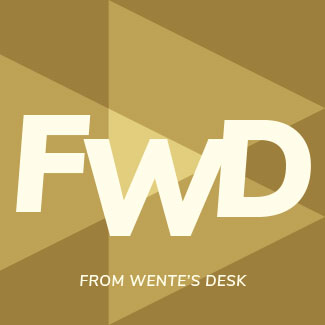Converging on our future

One of my favorite things about being part of a higher education community is the reliable rhythm of an academic year. The multiple beginnings, of the semesters and year as a whole, provide opportunities for excitement and starting anew. The multiple endings, likewise, bring opportunities for reflection and rejuvenation. As this academic year – my “sophomore” year as president – comes to a close, I am reflecting on the tremendous progress we’ve made together in determining the future of our Great University.
During our more than nine months of strategic framing, so many in our university community have deeply engaged. From this, we have a broad and inclusive, yet decisive, answer to the first question I posed this year: Who are we now? Our direction for the future, and our journey to 2034 and beyond, are also coming more and more into focus. Much of the good work we’ve accomplished this year is documented on our strategic framework website, framework.wfu.edu. Taken together, the forward-looking ideas are themselves rejuvenating as I think about the next academic year. But, first, as any good academic would do, I’ll ground our dialogue here in context (a literature review, if you will) and then share the most recent developments.
My vision for Wake Forest is that we will be a catalyst for good in society.
The University’s unique value proposition – our North Star – as articulated by the Core Planning Team is that Wake Foresters will embody Pro Humanitate at home and in the world.
The three thematic goals upon which our Strategic Framework is built are:
- We will be a lifelong learning community that calls all to develop their full potential to contribute in a diverse and complex world.
- We will foster a community of inquiry through research, scholarship, and creative work that transcends boundaries to address the challenges facing humanity and our world.
- We will build meaningful, mutual partnerships to honor our commitment to the well-being of our local, regional and global communities.
And this semester, five topical and intentionally overlapping working groups have proposed a vision for both core elements and objectives that will create the means to achieve our goals. With input from across our university community, these groups analyzed where we are now and where we should focus going forward:
- Enrich the student experience
- Frame the future of excellence in teaching and academic engagement
- Enhance impact through distinction in research, scholarship and creative work
- Build on Wake Forest’s unique role in supporting the well-being of the communities we call home.
- Define principles and pathways for engaging in sustainable partnerships locally and globally
Just last week, the working groups took further steps to invite feedback on their proposed objectives during poster presentation sessions. They are now finalizing concept papers that represent the totality of their efforts and the feedback.
I feel inspired by the products of our work this year and what they suggest for our future. I am particularly excited to see the convergence of ideas emerging from the working groups. For example, an emphasis on experiential learning as a core pedagogical approach independently emerged from three of the five working groups. And, not only is the centrality of the teacher-scholar model noted by several working groups, but the centrality of our comprehensive commitment to a truly holistic student experience also appears across multiple groups. The fact that the voices of so many have come together in this way is powerful and provides great confidence and clarity as we choose among the multiple possible pathways that will further our place as a Great University into our third century.
We now have The Why (Pro Humanitate), The What (communities of learning, inquiry and wellbeing), and a strong convergence on The How by which we will take action to build for our future.
After reviewing a draft of the Strategic Framework with the Board of Trustees in June, the refined draft will be shared with the University community at the beginning of the fall semester. At that time, I will also lay out plans for next steps including inclusive approaches for taking action and diving more deeply into feasibility, sequencing, and implementation efforts.
I’ve spoken often about the importance of feedback loops and consensus building, and in my blog last month I reflected on how the transparent and inclusive process by which we have undertaken this work is also a tangible product. It is an invaluable outcome on its own to have had the opportunity to connect and unite as Wake Foresters. Together, we have accomplished so much this year. I am sincerely grateful to the leaders and members of the Core Planning Team and the Working Groups; and to each of you who shared your vision for the future Wake Forest. Your profound commitment to our Great University ensures Wake Forest will be a catalyst for good in society.
Categories: From Wente's Desk
